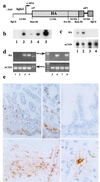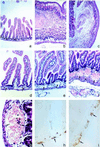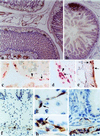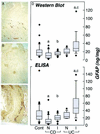Enterocolitis induced by autoimmune targeting of enteric glial cells: a possible mechanism in Crohn's disease?
- PMID: 11687633
- PMCID: PMC60866
- DOI: 10.1073/pnas.231474098
Enterocolitis induced by autoimmune targeting of enteric glial cells: a possible mechanism in Crohn's disease?
Abstract
Early pathological manifestations of Crohn's disease (CD) include vascular disruption, T cell infiltration of nerve plexi, neuronal degeneration, and induction of T helper 1 cytokine responses. This study demonstrates that disruption of the enteric glial cell network in CD patients represents another early pathological feature that may be modeled after CD8(+) T cell-mediated autoimmune targeting of enteric glia in double transgenic mice. Mice expressing a viral neoself antigen in astrocytes and enteric glia were crossed with specific T cell receptor transgenic mice, resulting in apoptotic depletion of enteric glia to levels comparable in CD patients. Intestinal and mesenteric T cell infiltration, vasculitis, T helper 1 cytokine production, and fulminant bowel inflammation were characteristic hallmarks of disease progression. Immune-mediated damage to enteric glia therefore may participate in the initiation and/or the progression of human inflammatory bowel disease.
Figures





References
-
- Ridet J L, Malhotra S K, Privat A, Gage F H. Trends Neurosci. 1997;20:570–577. - PubMed
-
- Janzer R C, Raff M C. Nature (London) 1987;325:253–257. - PubMed
-
- Bush T G, Puvanachandra N, Horner C H, Polito A, Ostenfeld T, Svendsen C N, Mucke L, Johnson M H, Sofroniew M V. Neuron. 1999;23:297–308. - PubMed
-
- Ransohoff R M, Tani M. Trends Neurosci. 1998;21:154–159. - PubMed
Publication types
MeSH terms
Substances
Grants and funding
LinkOut - more resources
Full Text Sources
Medical
Molecular Biology Databases
Research Materials

